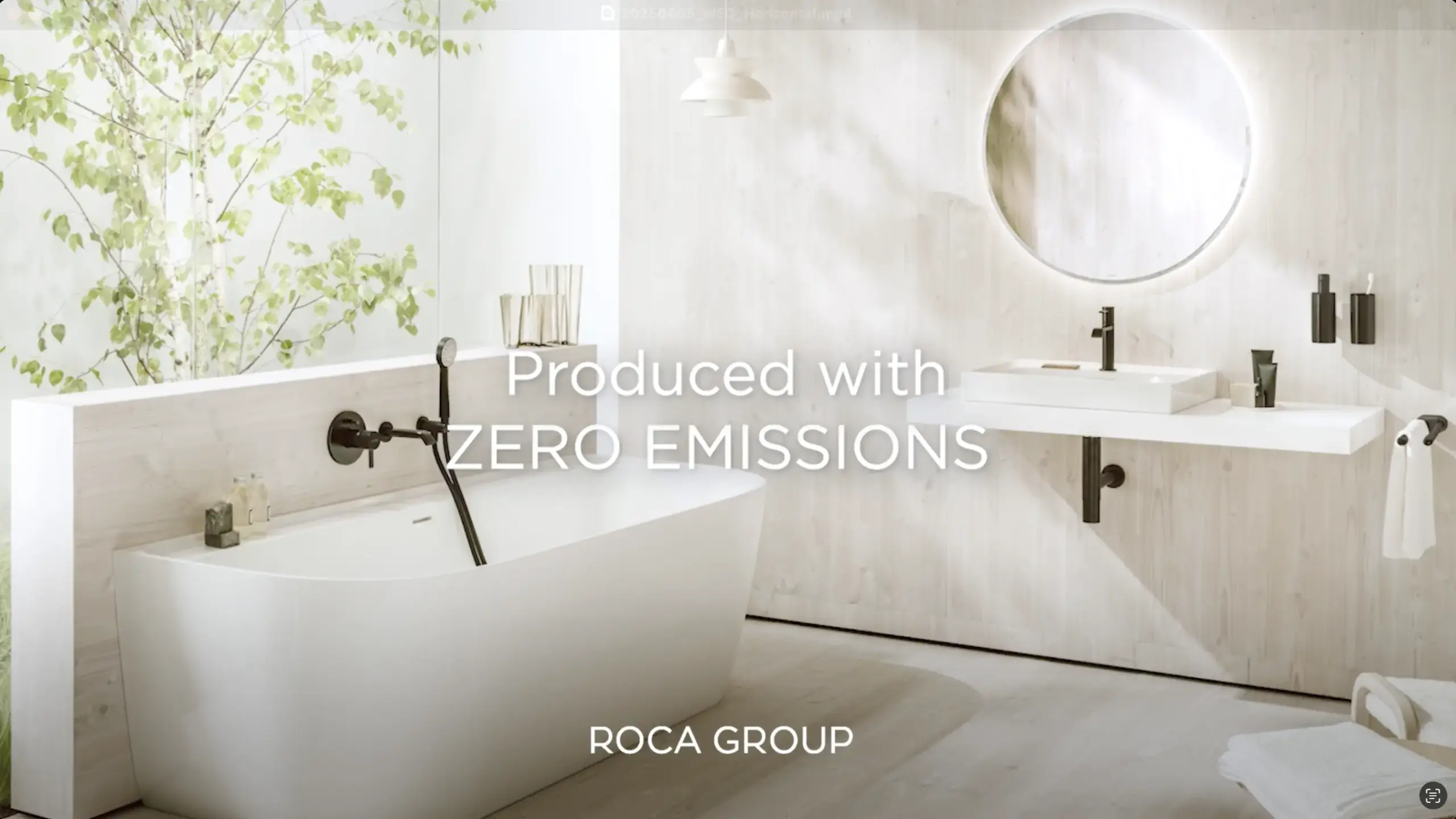June 4th, 2025
Roca Group now produces complete bathrooms without emissions
With a clear commitment to achieving net-zero emissions in operations by 2045, Roca Group has already reduced its direct CO₂ emissions by over 50% since 2018.

June 4th, 2025
With a clear commitment to achieving net-zero emissions in operations by 2045, Roca Group has already reduced its direct CO₂ emissions by over 50% since 2018.
According to data from the United Nations, 57.1 gigatonnes of greenhouse gases were emitted globally in 2023 — the highest level ever recorded. These figures underscore the urgent need to take effective action to reverse this trajectory and avoid the most devastating consequences of climate change.
Roca Group, the world’s leading company in bathroom products with 78 factories across five continents, is firmly committed to fully decarbonizing its operations — traditionally reliant on fossil energy and intensive in greenhouse gas emissions.
Conventional sanitary ceramics production is carbon-intensive, due to natural gas combustion in kilns that must reach temperatures above 1200°C, along with additional thermal needs for drying and paste preparation.
But in 2023, Roca Group set a new sustainability benchmark in the ceramics industry by commissioning the world’s first electric tunnel kiln to produce sanitaryware. This pioneering technology, implemented at the Gmunden plant in Austria, enables the production of basins and toilets without carbon emissions — setting a new standard for sustainable ceramic manufacturing.
After years of development, the electric tunnel kiln began producing washbasins in November 2023, demonstrating its transformational potential for the ceramics industry. Beyond sanitaryware, this innovation opens new opportunities for sectors such as tiles, structural ceramics, technical ceramics, and tableware.
In 2024, the decommissioning of gas-fired kilns eliminated nearly 80% of emissions at the Gmunden plant. But the effort didn’t stop there: Roca Group completed the full decarbonization of the site by electrifying all remaining processes — replacing gas boilers with heat pumps and electric systems to support mold shop heating and water preparation for ceramic paste.
Today, Gmunden is the first sanitary ceramics factory in the world to operate with net-zero emissions, with 100% of processes electrified and powered entirely by renewable electricity with certified guarantees of origin — including a photovoltaic installation of 4,000 solar panels that self-generates 20% of the plant’s total energy demand.
Roca Group also manufactures emission-free faucets at its facility in Vitória de Santo Antão, Brazil, which produces over one million units per year. This site completed its decarbonization roadmap by replacing gas-fired heating systems for the galvanizing baths with electric alternatives.
All of Roca Group’s operations in Brazil — including its nine factories — run exclusively on electricity sourced from certified renewable energy. As a result, the Vitória faucet plant now produces faucets with net-zero emissions throughout the manufacturing process.
In the first quarter of 2025 alone, the plant reduced its electricity consumption per ton produced by 47% compared to the previous year. This was achieved through energy efficiency actions such as polishing line automation, compressor optimization through shift-based load balancing, and improved boiler regulation.
Today, bathtubs and shower trays can also be produced entirely without emissions. At the group’s Anadia plant in Portugal, bathtubs and trays made of composites and acrylics are now manufactured using only renewable electricity with certified origin.
The process electrification project replaced natural gas systems used for resin curing, pre-heating of raw materials, and sanitary water heating — all tailored to the specific thermal requirements of each stage.
Energy efficiency measures have also been implemented — including optimized compressor management, lighting circuits, and tunnel curing temperatures. As a result, despite full electrification, the plant achieved a 10% reduction in electricity consumption per ton produced compared to the previous year.
In the same industrial complex in Anadia, Portugal, Roca Group launched a new shower screen production plant in 2024 — born with net-zero emissions from the outset. The factory was designed with this goal in mind, equipped entirely with energy-efficient electric systems, and highly automated to ensure maximum efficiency.
This plant is also the flagship of Roca Group’s Industry 4.0 and digitalization program. Its advanced monitoring system delivers real-time energy consumption data by section and process, enabling the early detection and correction of inefficiencies.
With a clear commitment to achieving net-zero emissions in operations by 2045, Roca Group has already reduced its direct CO₂ emissions (Scope 1 and 2) by over 50% since launching its climate transition plan in 2018. Over the same period, the group has also achieved a 55% reduction in energy intensity.
Roca Group’s sustainability commitment extends beyond the environment — it also drives a positive impact on people and generates prosperity. In recognition of this holistic approach, in 2025 the company received the Platinum Medal from EcoVadis for its sustainability performance. This distinction places Roca Group among the top 1% of companies globally, evaluated across 150,000 organizations in 180 countries, based on criteria including environmental impact, ethics, sustainable procurement, human rights, and labour practices.